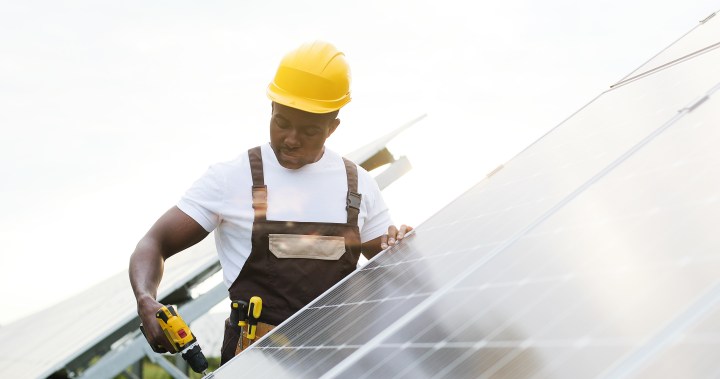SPONSORED CONTENT
Newly released market intelligence reports highlight investment opportunities in the green economy

Every year, GreenCape publishes a set of green economy market intelligence reports (MIRs). These reports are free to download from GreenCape's website. They are updated annually to reflect changes in the macro environment, and highlight investment opportunities in various green economy sectors. GreenCape’s sector experts identify these investment opportunities through direct engagements with key industry players, government and leading academics.
The 2023 reports are published in partnership with the UK’s Partnering for Accelerated Climate Transitions (PACT) programme, the Friedrich Naumann Foundation for Freedom and the Western Cape Government Department of Agriculture.
The market intelligence reports provide an overview of the national markets in energy, electric vehicles and water, and regional Western Cape market for sustainable agriculture. This includes sections highlighting key developments and achievements, the key players, legislation and regulation, market opportunities and challenges, as well as funding opportunities.
“We are thrilled to support the publication of GreenCape’s market intelligence reports which play a pivotal role in driving much-needed investment into South Africa’s energy, water, agriculture and electric mobility sectors,” said Cecelia Kok from the Friedrich Naumann Foundation. “For South Africa and its people to prosper, the just transition must succeed. The reports help to promote the transition by providing invaluable information to green economy investors.”
Lowering carbon emissions is at the heart of the global climate change narrative, but a green economy will mean so much more for the people of South Africa. A green economy is an inclusive economy with decent jobs underpinned by sustainable, meaning efficient, clean and profitable, infrastructure solutions that will create and sustain jobs and well-being for this generation and the generations to come. A green South African economy is socially inclusive and environmentally sustainable.
The following investment opportunities are highlighted in the 2023 MIRs.
Water 2023 MIR
Published in partnership with FNF Africa.
Water investment opportunities highlighted in the 2023 MIR:
- The upgrade of wastewater infrastructure in the public sector: R8.14 billion in investment is required to restore the wastewater treatment works (WTWs) in the country to a functional state. The eight metros make up R2.76 billion of the total investment required. The various market opportunities are related to infrastructure refurbishment, repair, replacement, maintenance, and expansion.
- The beneficiation of public sector wastewater sludge: Landfilling of wastewater sludge costs metropolitan municipalities across South Africa an estimated R132 million per annum. There are related market opportunities in wastewater sludge beneficiation, including handling, transportation and off-take agreements.
- The implementation of renewable energy and energy efficiency interventions at public sector WWTWs: Various market opportunities related to WWTWs including the supply, installation and operation of energy efficient and renewable energy technologies.
Energy Services 2023 MIR
Published in partnership with UK PACT, video produced in partnership with FNF Africa.
The term energy services (ES) is used to describe three interrelated energy market segments in the South African energy space, namely small scale embedded generation (SSEG) (encompassing system sizes <1 MWp); energy storage; and energy efficiency (EE). Rising electricity prices, energy insecurity, dropping technology costs, supportive energy policies, and policy related incentives prompt consumers to explore alternative energy options driving the growth of the ES market in SA and creating a thriving value chain.
Positive regulatory movement, investor sentiment, and steady recovery in the key commercial, industrial, and agricultural sectors have led to continued market growth in 2022. The market is still expected to reach a total capacity of 10 GWp by 2035 at a market value of ~R100 billion. This steady growth, which translates to the potential creation of ~1 250 jobs, is significant in the South African context, considering the ongoing need to reduce the current unemployment rate.
Energy services investment opportunities highlighted for 2023:
- Rooftop solar PV installations: 600-900 mwp p/a, R7.5 billion p/a.
- Behind-the-meter storage: 250 mwh p/a, R2 billion p/a.
- Smart meters: 100 000 to 300 000 upgrade P/A, R1.2 –1.6 billion p/a.
Electric Vehicles 2023 MIR
Published in partnership with UK PACT, video produced in partnership with FNF Africa.
The emerging electric vehicles market currently represents a small share of the South African automotive industry, but presents substantial opportunities for businesses and investors active and interested in the sector.
Four key market opportunities have been identified as attractive sectors for investment in the EV industry in South Africa:
- Local manufacturing and electrification of public transport.
- Electric micro-mobility for last-mile delivery.
- Local manufacturing of electric private passenger vehicles.
- Local lithium-ion cell manufacturing.
Large-scale Renewable Energy 2023 MIR
Published in partnership with UK PACT, video produced in partnership with FNF Africa.
Large-scale renewable energy investment opportunities highlighted for 2023:
- Public procurement of new generation capacity: This opportunity is related to any new renewable energy capacity generated by Independent Power Producers (IPPs) either being sold to the national utility (procured through the Renewable Independent Power Producer Programme (REIPPP)) or to public entities such as local municipalities. The Integrated Resource Plan (IRP) stipulates the total market size for electricity generation needed to meet the country’s demand.
- Private procurement of new generation capacity: The potential market size for this opportunity was approximated by the IRP 2019 to be ~500 MW per year, this has however already been exceeded in 2022. For example, the mining sector has reported a pipeline of renewable energy projects over 2 GW that could be brought on stream in 2022/23, with an estimated cost of between R30 billion and R40 billion. The leading technology of interest is solar PV, alongside solar-diesel hybrid power projects or battery energy storage systems for overnight operations.
- Local manufacturing of renewable energy components and systems: It is estimated that by 2030 ~14 million solar panels and ~3 600 wind turbines would be required to fulfil IRP 2019. Annual production assumes 70-90% localisation of key components and 90% of the balance of plant by 2030.
Sustainable Agriculture 2023 MIR
Published in partnership with WC DoA, video produced in partnership with FNF Africa.
Sustainable agriculture investment opportunities highlighted in the 2023 MIR:
- Renewable energy applications: While renewable energy alternatives such as solar PV systems, solar-powered irrigation systems and wind energy have remained popular, there are other technologies which could have substantial potential in agriculture, particularly solar drying technology.
- Regenerative agriculture: Regenerative Agriculture (RA) is a holistic farm management concept that not only includes maintaining current soil health but also rehabilitating soil that has been degraded due to exploitative production practice.
- Smart farming: Refers to the use of technology to better inform where and how resources are dispensed on a farm.
- Circular agriculture: AD technology can provide a solution to a growing number of issues in the agricultural sector, in particular: energy security for both seasonal and continuous production; management of agricultural waste residues and wastewater; and replacement of chemical-based fertilisers with a nutrient-rich soil enhancer.
GreenCape’s support to businesses and investors
Through close working relationships with businesses, investors, government, and academia, GreenCape’s sector desks are in a unique position to collect, create, and disseminate free market intelligence on the green economy. Get in touch to explore these investment opportunities in greater depth. OBP/BM
About GreenCape: GreenCape is a non-profit organisation that drives the widespread adoption of economically viable green economy solutions from South Africa. The team works with businesses, investors, academia and government to unlock the investment and employment potential of green technologies and services, and to support a transition to a resilient green economy. GreenCape’s vision is to create a thriving and prosperous Africa using green economy principles. Our aim is to be globally relevant in driving the uptake of green economy infrastructure solutions in the developing world context.


















Comments - Please login in order to comment.